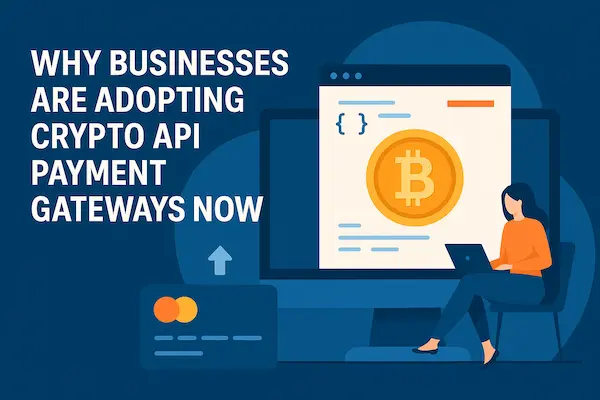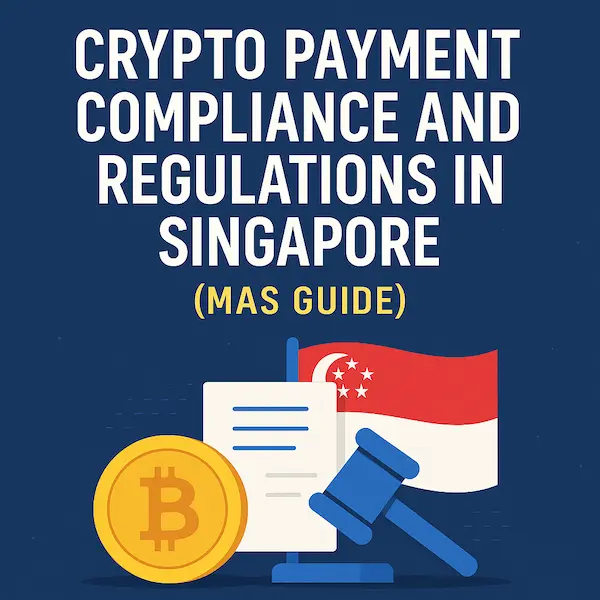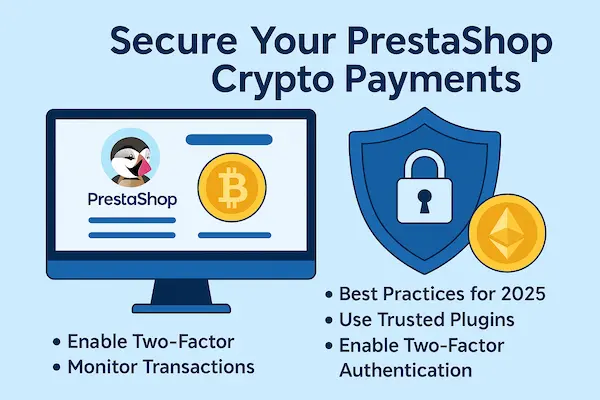Adopting payments with cryptocurrency has become a necessity for businesses who want to innovate and grow. This is usually the result of a efficient crypto API payment gateway. These tools enable developers and merchants to integrate their systems with digital assets in a much easier manner, resulting in simplified transactions and broader customer bases.
In this article, we describe why a crypto api payment gateway is important, explain its documentation so that you can understand it, and list the most important aspects that will help you determine which crypto api payment gateway will suit your needs the best.
Contents
- 1 Why Businesses Need a Crypto API Payment Gateway
- 2 The Best Crypto API Payment Gateways and Their Outstanding Features
- 3 Comparison Table: Crypto API Payment Gateways (2026)
- 4 Managing volatility with your crypto API payment gateway
- 5 Working with documentation for Crypto Payment Gateway API
- 6 Considering Your Crypto API Payment Gateway Options: Integration and Configuration
- 7 Custom Crypto Payment Gateway APIs – Why And When To Use Them
- 8 Top Use Cases in 2026
- 9 Emerging Trends in Crypto API Payment Gateways for 2026
- 10 Why Businesses Are Adopting Crypto API Payment Gateways Now
- 11 FAQs – Crypto API Payment Gateway
- 12 Conclusion: Powering the Next Era of Digital Payments with Crypto APIs
Why Businesses Need a Crypto API Payment Gateway
There is an obvious trend of businesses adopting APIs fueled by the accessibility presented by cryptocurrencies to diverse consumer bases across the globe. Business owners want to capture emerging opportunities from users who hold cryptocurrencies by providing alternative methods of making payments. A crypto API payment gateway often facilitates lower transaction fees compared to traditional payment rails, especially for international transactions than other gateways. Additionally, these gateways lessen chargeback risks because of the unchangeable nature of block chain transactions.The combination of extended market access coupled with cost effectiveness provide businesses unparalleled value transforming them into cornerstone gateways for contemporary eCommerce.

The shift toward digital-first economies is pushing companies of all sizes to rethink how they handle transactions. Crypto API payment gateways have emerged as a flexible, cost-effective, and globally accessible solution—bridging the gap between traditional finance and decentralized assets.
Table 1: Crypto API Payment Gateway vs Traditional Payment Gateway
| Criteria | Crypto API Payment Gateway | Traditional Payment Gateway |
|---|---|---|
| Transaction Speed | Near-instant (1–5 seconds with stablecoins & Layer-2 networks) | 1–3 business days (SWIFT, credit card settlements) |
| Transaction Fees | Low (0.2–1%), no banking intermediaries | High (2–5%) + foreign exchange fees |
| Cross-Border Payments | Global, borderless, 24/7 availability | Limited by banks, countries, and time zones |
| Transparency & Security | Blockchain records, fraud-resistant, supports KYC/AML | Chargeback risks, dependent on intermediaries |
| Integration Flexibility | Easy via REST APIs/SDKs; supports e-commerce, Web3, mobile apps | Complex setup, lengthy approval processes |
| Currency Options | Supports Bitcoin, Ethereum, Stablecoins (USDT, USDC, DAI), and future CBDCs | Fiat currencies only (USD, EUR, etc.) |
| Scalability | Highly flexible, suitable for startups and enterprises | Restricted by banking infrastructure |
1. Meeting Global Customer Expectations
In 2026, the digital-native generation is becoming the dominant consumer group. These customers expect instant, borderless payment options, and are more likely to trust brands that accept cryptocurrency. By integrating a crypto API payment gateway, businesses can meet these expectations without overhauling their existing checkout systems.
2. Lower Transaction Costs and Increased Margins
Traditional cross-border payments often involve multiple intermediaries, each taking a fee. Crypto API gateways bypass these intermediaries, significantly reducing processing fees—sometimes to less than 1% per transaction. Over time, this cost saving can translate into higher profit margins or more competitive pricing.
3. Real-Time Settlement for Better Cash Flow
Unlike traditional payment processors that can take days to settle, crypto API gateways can transfer funds to a merchant’s wallet or bank account within minutes. This improves liquidity and enables faster reinvestment, a critical advantage in fast-moving industries like e-commerce, travel, and event ticketing.
4. Built-In Security and Fraud Protection
Blockchain transactions are inherently transparent and secure, but API gateways go a step further by embedding encryption protocols, multi-signature verification, and real-time fraud detection. This layered security approach helps businesses reduce chargebacks, prevent double-spending, and safeguard customer trust.
5. Adapting to Rapid Regulatory Changes
Governments around the world are refining crypto regulations, and compliance is becoming a moving target. Modern payment gateways integrate automated KYC/AML verification, travel rule enforcement, and country-specific compliance filters—helping merchants stay operational in multiple jurisdictions without manual intervention.
6. Leveraging Analytics for Strategic Growth
The latest generation of crypto API gateways provides deep analytics on customer behavior, transaction patterns, and token preferences. Merchants can use this data to launch targeted promotions, adjust pricing in real time, and identify new market opportunities—turning payments from a back-office function into a revenue growth driver.
The Best Crypto API Payment Gateways and Their Outstanding Features
In your search for the best crypto API payment gateway, it is necessary to look beyond the basic level of functionality. Frosted features enhance flexibility, security, and scalability tailored for upper-tier gateways.
Comprehensive cryptocurrency support
Flexibility and availability should be strived for by all crypto API payment gateways if extended access from many cryptocurrencies is provided. Doling out altcoins along with stablecoins such as USD or USDC ensures clients get optimum satisfaction while using these APIs. With this kind of robust offer from a gateway, businesses will not feel restricted as to the type of crypto they wish to accept via their crypto API payment gateways. This form of unrestrained freedom enables outlets to purchase and plant Bitcoin (BTC) funds on various global markets freely just like Ethereum (ETH).
Streamlined Conversion of Fiats And Payouts
Without converted payments at times the charges can lead to losses especially with ups and downs fluctuations in the market therefore crypto is deemed better. Kudos go out to AccessingInstant conversion services alongside fraction conversion ensures that financial aid using USD or EURO greatly enhances pre-determined currency withdrawal restrictions placed within bank accounts effortlessly limits exposure dealing with volatile marketplaces full encompassing high demand currencies and cryptocurrencies.

Comparison Table: Crypto API Payment Gateways (2026)
| Feature | XAIGATE (Managed Crypto API) | Direct Wallet Integration (Self-Custody) | Open‑Source API (Self‑Hosted) | Custodial API Providers (e.g. Coinbase Commerce API) |
|---|---|---|---|---|
| API Access & SDKs | Full REST & SDK support (JavaScript, PHP, Python) | No API—manual transactions only | Community-maintained API wrappers | API SDKs available, limited customization |
| Token & Network Support | 9,800+ coins across major chains & stablecoins | User must manage all tokens manually | As configured—limited to chosen chains | ~10–20 tokens mostly major coins |
| Custody Model | Non‑custodial API—merchant retains private keys | Fully self-custodial | Self-managed—full key ownership | Custodial; provider holds funds |
| Compliance / KYC Logic | Tiered KYC, optional at low volume, automated AML features | DIY compliance—high operational load | Self-managed compliance module | Mandatory KYC for merchants |
| Transaction Fees | Fixed 0.2%–0.3% per tx, predictable | Blockchain fee only, no service fee | None (requires hosting infrastructure budget) | Typically ~1% + withdrawal or conversion fees |
| Settlement Speed | Under 5 minutes via supported chains | Real-time, network-constrained | Dependent on network and node setup | Minutes to hours depending on API and chain |
| Webhook & Notification System | Built-in webhooks for settlements, refunds, chargebacks | Not available; polling only | Community-level implementations | Webhook support exists but limited by custodian policies |
| Setup & Deployment Complexity | <1 hour via API onboarding | High; manual wallet integration | High; requires server infrastructure | Low; onboarding via provider’s platform |
| Support & SLA | 24/7 live support, SLA-backed uptime | None unless handled in-house | Community support only | Tiered support; enterprise plans available |
| Refund & Reconciliation Logic | Merchant-level refund logic built-in; blockchain immutable record | DIY—complex to implement | Custom coding required | Refunds processed via custodian policy |
| Scalability | Enterprise-grade—handles high volume and token diversity | Limited by developer capacity | Server-limited scalability | Good for volume but subject to custodial controls |
Why XAIGATE Stands Out for Developers
-
API-first architecture designed to plug into any platform—mobile, web, or microservices.
-
Full wallet ownership with automated integrations, unlike custodial services that hold your keys.
-
Transparent pricing and speed that dwarf self-hosting overhead and custodial unpredictability.
-
Automated compliance and KYC flows that abstract regulatory complexity without vendor lock-in.
-
Rich event-based webhooks and SDK support, facilitating real-time analytics, accounting, and business logic around crypto settlement.
Managing volatility with your crypto API payment gateway
Volatility is a characteristic of the crypto market. The best crypto API payment gateway offers features to manage this, such as immediate conversion upon payment receipt. This ensures that the fiat value is locked in at the time of the transaction, safeguarding your business from possible declines in price after a customer pays with crypto. This feature protects revenue volatility while using a crypto API payment gateway.
Security and compliance requirements continue to be rigorous
Safety remains fundamental for any payment systems. The best crypto API payment gateways implement strict industry security protocols such as strong encryption for data both in motion and static, two-step verification on merchant accounts, alongside dedicated anti-fraud systems. crm systems online need also to comply with financial regulations like KYC(Know Your Customer) and AML (Anti Money Laundering). A well-established provider of crypto API payment gateways will comply to these requirements ensuring operations are legal and safe.
Working with documentation for Crypto Payment Gateway API
Documentation quality can determine the success of an integration project for developers and technical teams provided they have access to a good crypto payment gateway API documentation. It’s the blueprint for connecting your systems.
Why exhaustive integration documentation is important
Clear and complete documentation of crypto payment gateway APIs is crucial for the proper implementation of the gateway’s functionalities by developers. Integration can be a cumbersome, frustrating, and error-filled process without instructions. Documentation can prevent bugs in development and ensure smooth functioning of the crypto API payment gateway. It reflects a provider’s investment in developer’s success. It helps them avert sinking money into resources that aren’t needed.

Read more: How to Create Crypto Payment Gateway
What to focus on in crypto payment gateway API documentation
In reviewing crypto payment gateway api documentation, focus on clarity, completeness and order. Ensuring detailed explanations are provided of all the endpoints, request/response formats, error messages as well as authentication methods will make your work simpler too. Developers should not waste their time trying to figure out how to navigate through illogically structured documentation resources which do not make ease of access to information seamless crypto API payment gateways can be integrated effortlessly.
Code examples and SDKs for easy integration
The ideal providers of crypto API payment gateways surpass expectations by offering technical documents because their best provide code examples for programming languages such as Python, Node.js PHP or even SDKs (Software Development Kits) which further simplify integration. Documentation isn’t meant to make life difficult; it serves a clear purpose: rapidly advancing software development so your team doesn’t have to start from square one just because they need a crypto API payment gate.
Considering Your Crypto API Payment Gateway Options: Integration and Configuration
With growing competition, choosing the right crypto API payment gateway for your business is becoming harder. Careful selection based on business needs makes the process straightforward and painless.
Assessing fee structures and transaction limits
Fees are a significant consideration. Focus on the fees that apply to your transactions, including tiered fees per withdrawal, percentage-based fees, fixed rates or anything else which may be considered a hidden fee. Some providers might offer a low-fee crypto API payment gateway for certain transaction volumes. Also, check for any minimum or maximum transaction limits that might impact your business operations. A transparent and competitive fee structure is a hallmark of a desirable crypto API payment gateway.
Dependable uptime and reliability with growing organizations for future needs
Any crypto API payment gateway you select must provide scalable solutions as your company expands. Aspects like expanding transaction amounts and maintaining systems uptime require capability as well as dependability from the infrastructure provider. Look for providers who are reputable in uptime guarantees backed by reliable system architecture. Reliability means uninterrupted service during high-demand periods which is critical in determining the best crypto API payment gateways.
Customer support and developer resources
Exceptional customer support makes dealing with emerging innovations such as cryptocurrency easier especially when they are specialized in that industry too. Make sure that 24/7 support with dedicated account managers and primary contact lines are available through the accounts provided. Having active forums dedicated specifically to developers alongside other technical resources aids in solving problems faced during the optimization of the crypto API payment gateway integration making them very helpful around troubleshooting.

Read more: How to Receive Bitcoin as Payment Easily
Custom Crypto Payment Gateway APIs – Why And When To Use Them
While third-party solutions offer convenience, some large enterprises or specialized platforms might consider developing a custom crypto payment gateway API.
The benefits of a custom crypto payment gateway API
Developing your own crypto payment gateway API means you have complete oversight on how every step of the payment procedure is handled. It can be aligned with your specific organizational workflows, enable seamless integration with proprietary software, and apply detailed structural safety measures select to it. This amount of flexibility may be necessary for businesses demanding greater sophistication or seeking to significantly alter the market proposition. You really are able to construct a crypto payment gateway API that no other entity will have.
Issues and chcallenges with custom development
The scope of custom work for creating a crypto payment gateway is enormous. In addition to advanced technical know-how, there is a huge monetary cost as well as an ongoing upkeep cost. Managing all the protective measures yourself, along with coping with external governing laws, compliance mandates, and benchmarks around growth creates additional burden. Most companies, particularly small and medium sized ones find this resource intensive structure doesn’t meet their needs and opt instead choose ready made solutions offered by leading providers.
Why Xaigate stands out among crypto API payment gateways
Xaigate differentiates itself by providing a highly reliable and secure crypto API payment gateway. It focuses on offering competitive transaction fees, aiming to become a low-fee crypto API payment gateway while providing extensive support for various cryptocurrencies and seamless fiat conversion. Their commitment toward user experience for merchants as well as customers makes Xaigate an appealing partner for any business seeking to adopt advanced digital payments via a robust crypto API payment gateway.
The decision of selecting a crypto API payment gateway is critical to the success of businesses entering into cryptocurrency payments. Understanding the essential elements, studying the provided documentation, and evaluating whether your business requires a customized solution or can utilize a ready-made payement gateway will ensure that you don’t get overlooked in your competition.
Comparative Overview — Crypto API vs. Traditional Payment Processors
| Criteria | Crypto API Payment Gateways | Traditional Payment Processors |
|---|---|---|
| Settlement Speed | 1–10 minutes (near real-time with Layer-2) | 2–5 business days (international can be longer) |
| Transaction Fees | 0.3% – 1% (often fixed per network) | 2% – 4% + currency conversion fees |
| Global Reach | Borderless, supports multiple cryptocurrencies & stablecoins | Restricted by banking networks and currency limitations |
| Currency Volatility Management | Automatic stablecoin conversion (USDT, USDC, etc.) | Fixed to fiat currencies; exposed to forex rates |
| Compliance | Built-in KYC/AML & travel rule integration | Compliance handled by payment provider, slower to adapt to new laws |
| Security | Blockchain-based transparency + encryption + API-level fraud detection | Bank-grade security but vulnerable to card fraud and chargebacks |
| Integration Time | Hours to a few days with SDKs and APIs | Days to weeks, depending on bank approvals and paperwork |
| Data & Analytics | Real-time transaction analytics, token usage trends | Limited reporting, often delayed batch data |
| Cross-Border Cost | Minimal or no extra fees | Often 2%–3% surcharge + intermediary fees |
Top Use Cases in 2026
As digital finance evolves, businesses are looking beyond traditional payment systems. A Crypto API Payment Gateway offers practical, high-impact solutions that are reshaping how money moves globally. In 2026, the following use cases are emerging as the most urgent and valuable for enterprises, startups, and even governments.
1. Cross-Border E-Commerce Expansion
Global online shopping is booming, with merchants in Asia, Europe, and Latin America serving customers across borders. Traditional payment providers often add high FX fees and slow settlement times, which can hurt conversion rates. By integrating a Crypto API, merchants can accept stablecoins or popular cryptocurrencies instantly, removing friction for international buyers.
Comparison: Cross-Border Payments (Crypto API vs Traditional)
| Criteria | Crypto API Payments | Traditional Cross-Border Payments |
|---|---|---|
| Settlement Time | Seconds to minutes | 2–5 business days |
| FX/Conversion Fees | 0–1% | 3–7% |
| Accessibility | Global, no banking barriers | Limited by country & banking systems |
| Chargeback Risk | None, blockchain-verified | High, dependent on card issuers |
2. Subscription and SaaS Payments
SaaS companies and digital platforms thrive on recurring revenue. However, credit card subscriptions face high churn rates due to card expirations, fraud alerts, and banking restrictions. Crypto APIs solve this by enabling programmable, recurring stablecoin payments with smart contracts, ensuring uninterrupted service.
Comparison: SaaS Billing (Crypto API vs Credit Cards)
| Criteria | Crypto API Billing | Credit Card Billing |
|---|---|---|
| Renewal Failure Rate | Very low (no card expiry) | High (card changes/expiry) |
| Payment Flexibility | Stablecoins, BTC, ETH | Limited to local currency |
| Settlement | Instant, blockchain-based | Days, through bank networks |
| Fraud Prevention | Blockchain transparency | Chargebacks and fraud common |
3. B2B Settlements and Supply Chains
Enterprises in manufacturing, logistics, and wholesale trade face cash flow bottlenecks when dealing with multiple currencies. With a Crypto API Payment Gateway, companies can settle invoices in stablecoins, reducing dependence on correspondent banks and cutting settlement times dramatically.
Comparison: B2B Settlements (Crypto API vs Bank Transfers)
| Criteria | Crypto API Settlements | Traditional Bank Transfers |
|---|---|---|
| Processing Time | 1–2 minutes | 2–7 business days |
| Global Reach | Borderless | Limited by SWIFT/banking networks |
| Fees | Very low | High, especially for multi-currency |
| Transparency | Full blockchain record | Bank-led, limited visibility |
4. Web3, NFTs, and Metaverse Commerce
In 2026, NFTs, gaming, and metaverse platforms require instant microtransactions. Traditional payment gateways cannot support real-time in-game or in-metaverse purchases. Crypto APIs allow seamless integration of stablecoins, tokens, and NFTs, making virtual economies function like real-world markets.
Comparison: Digital Commerce (Crypto API vs Traditional Payment Gateway)
| Criteria | Crypto API for Web3 | Traditional Gateway |
|---|---|---|
| Microtransaction Support | Yes, instant | No, high fees |
| Token/NFT Payments | Fully supported | Not supported |
| Global Participation | Open to anyone with a wallet | Restricted by card networks |
| Speed | Instant blockchain settlement | Hours to days |
5. Government & CBDC Integration
Governments worldwide are piloting Central Bank Digital Currencies (CBDCs). A Crypto API Payment Gateway offers the bridge between CBDC infrastructure and private sector businesses, ensuring citizens and merchants can transact in regulated digital money alongside stablecoins and crypto.
Comparison: CBDC Integration (Crypto API vs Legacy Payment Infrastructure)
| Criteria | Crypto API for CBDC | Legacy Payment Systems |
|---|---|---|
| CBDC Compatibility | Ready for digital currency | Not supported |
| Settlement Speed | Instant | Delayed (bank batch clearing) |
| Cost Efficiency | Minimal | Higher processing costs |
| Transparency | Blockchain-based | Closed, opaque systems |
Emerging Trends in Crypto API Payment Gateways for 2026
The world of cryptocurrency payments is undergoing a rapid transformation. In 2026, crypto API payment gateways are no longer just “add-on” payment options—they’re becoming core infrastructure for businesses operating in both local and global markets. New technologies, regulatory frameworks, and consumer expectations are reshaping how these gateways are built and used. Below are the most significant developments influencing adoption and performance.
1. Instant Payment Finality with Layer-2 Scaling
Layer-2 scaling solutions like Optimistic Rollups, zk-Rollups, and state channels are dramatically improving transaction speeds while reducing costs. Merchants can now confirm payments in seconds rather than minutes, allowing instant order fulfillment. This is especially critical for sectors like travel bookings, digital goods, and live event ticketing where speed is directly tied to revenue.
2. Dynamic Fee Optimization Engines
No business likes unpredictable transaction fees. Advanced crypto APIs are integrating AI-based fee routing systems that constantly monitor blockchain conditions and reroute payments through the cheapest, most efficient network. This can reduce costs by up to 70% in high-traffic periods, improving profitability for merchants and offering better prices for customers.
3. API-Native Fraud Detection and Risk Scoring
Fraud prevention is moving closer to the point of payment. Instead of relying solely on post-transaction reviews, modern payment APIs run instant fraud checks at the API level. They analyze wallet activity history, transaction behavior patterns, and blacklist data before approving a payment—reducing chargebacks and merchant losses.
4. Support for Programmable and Conditional Payments
Smart contract integration is making crypto payments more flexible. Merchants can now set up milestone-based payments, subscription billing, or escrow-style releases that trigger automatically when predefined conditions are met. This creates a safer and more transparent transaction flow for high-value or long-term contracts.
5. Wider Adoption of Stablecoins and Multi-Chain Support
To reduce volatility risk, gateways are expanding stablecoin support beyond USDT and USDC to include regional stablecoins pegged to local currencies. Multi-chain support—covering Ethereum, Solana, Polygon, and more—ensures faster settlement times and a smoother user experience, no matter which network customers prefer.
Why Businesses Are Adopting Crypto API Payment Gateways Now
The push toward crypto payment adoption is not just a technological trend—it’s driven by market demand, economic realities, and competitive pressure. For many companies, integrating a crypto API payment gateway has moved from “nice to have” to “must-have” in 2026.
1. Rising Consumer Demand for Digital Asset Payments
The number of active crypto wallet users has surged past 600 million worldwide, with a significant share using digital assets for everyday purchases. Customers expect businesses to accept Bitcoin, Ethereum, and stablecoins the same way they accept credit cards or PayPal. Merchants that fail to adapt risk losing a tech-savvy, high-spending customer base.
2. Protection Against Inflation and Currency Instability
In regions experiencing rapid inflation or currency devaluation, crypto payment gateways offer an immediate hedge. Merchants can automatically convert received payments into stablecoins within seconds, preserving value and avoiding exchange rate shocks. This is becoming especially important in emerging markets.
3. Compliance from the Start
Regulatory frameworks are tightening across the globe, but modern crypto APIs come with compliance tools embedded—KYC, AML, and travel rule checks are performed automatically in the background. This makes it easier for even small businesses to enter the crypto payment space without fear of legal missteps.
4. Competitive Differentiation in Cross-Border Commerce
By eliminating intermediaries like correspondent banks, crypto API gateways allow for faster cross-border settlements at lower costs. Businesses can pass these savings on to customers through better pricing or faster delivery times—creating a significant competitive advantage in international markets.
5. Better Developer Experience Accelerates Adoption
Today’s crypto payment APIs are designed with developers in mind—providing SDKs, sandbox environments, webhooks, and detailed documentation. This allows integration in hours instead of weeks, which is crucial for startups and platforms that need to move fast.

FAQs – Crypto API Payment Gateway
1. What exactly is a crypto API payment gateway?
A crypto API payment gateway enables businesses to embed cryptocurrency payments directly into their platforms using custom code, offering full control over the checkout flow.
2. Why choose an API-based gateway over a plugin?
An API gateway delivers flexibility and customization. You can tailor payment experiences, add custom logic, and integrate with any tech stack—not limited by plugin frameworks.
3. Which cryptocurrencies are supported via API?
Most API gateways support Bitcoin, Ethereum, stablecoins like USDT/USDC, and even tokens across chains like BNB, Solana, and Polygon.
4. How is security handled in an API gateway?
Good API gateways enforce SSL/TLS, API key management, HMAC verification, and webhook validation to ensure secure communication and transaction integrity.
5. Do I need developer resources to integrate a crypto API?
Yes, integrating an API typically requires a developer familiar with REST or WebSocket protocols—but good providers include SDKs and example code to speed up integration.
6. Can API gateways auto-convert crypto to fiat?
Many gateways offer optional auto-conversion features, converting received crypto into fiat currencies like USD or EUR immediately upon payment.
7. How quickly do API-based crypto transactions process?
Transaction speed depends on the blockchain used, but popular chains like Ethereum and BNB often confirm in under a minute.
8. Can I handle refunds via API?
Yes, comprehensive crypto API gateways support refund endpoints, enabling you to automate both full and partial refunds programmatically.
9. Is it possible to track transactions in real-time via the API?
Absolutely. Most APIs include webhook callbacks and endpoints to retrieve transaction status, confirmations, and payment metadata in real-time.
10. What are common integration pitfalls to avoid?
Avoid hardcoding addresses, neglecting webhook security, skipping sandbox testing, and not handling edge cases like chain reorgs or rate-limiting.
Conclusion: Powering the Next Era of Digital Payments with Crypto APIs
The shift toward crypto API payment gateways marks a defining moment in the evolution of global commerce. In 2026, businesses no longer see cryptocurrency as an experiment—it has become a necessity for reaching borderless markets, reducing transaction costs, and delivering real-time settlement. With developer-friendly APIs, companies can easily integrate multi-crypto payments, automate workflows, and future-proof their financial infrastructure.
Choosing the right gateway comes down to what matters most: low fees, scalability, compliance readiness, and security. While many platforms perform well in one or two areas, only a handful deliver across the board. Among them, XaiGate stands out as the leading choice—offering instant settlements, transparent fees, multi-crypto + stablecoin support, and robust APIs that adapt to businesses of every size.
Start Building with XaiGate API Today
The businesses that thrive tomorrow are those that innovate today. By integrating XaiGate’s Crypto API Payment Gateway, you unlock faster global transactions, greater customer trust, and the flexibility to scale without limits.
| Why Choose XaiGate API | Benefit for Your Business |
|---|---|
| Low fees (0.2%) | Higher profit margins |
| Multi-crypto + stablecoins | Reach global customers with ease |
| Instant settlement | Stronger cash flow, lower risk |
| Enterprise-grade security | Protects funds + builds customer trust |
| Developer-friendly API | Seamless integration & scalability |
👉 The future of payments is already here. Don’t wait—start building with XaiGate API today and stay ahead of the competition.
For daily updates, subscribe to XAIGATE’s blog!
We may also be found on GitHub, and X (@mxaigate)!









